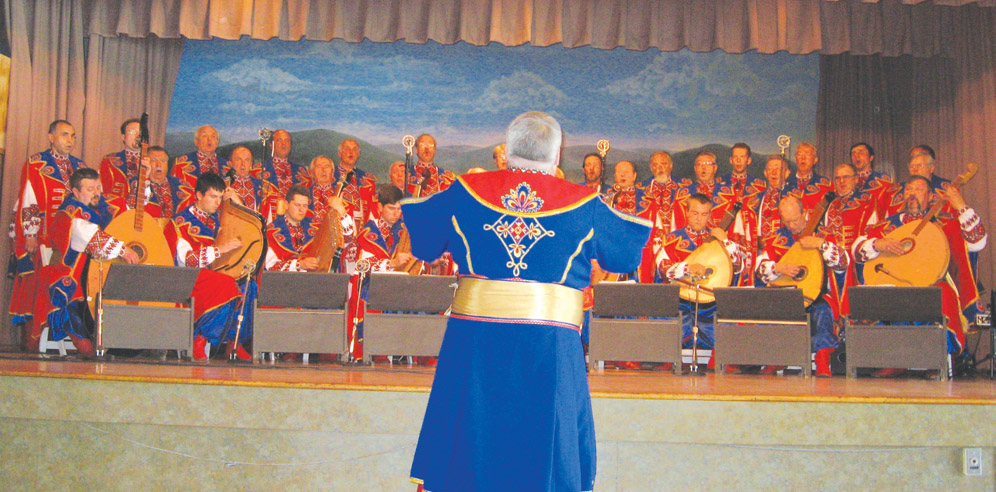
Triumphant
Trip to Soyuzivka
Nestled high

The first concert
performed, entirely by the Canadian Bandurist Capella, was held at the Veselka
Hall overlooking Soyuzivka’s patio and swimming pool. The colourful
appearance of the banduristy and singers evoked immediate applause.
Petro Stilmashenko, in Ukrainian, introduced Dr. Victor Mishalow, Merited
Artist of Ukraine, Artistic Director and Choir Director, in the absence of
Choir Master Andriy Dmytrovych. The Capella’s Concert Master is Yurij
Petlura. English introductions were made by Petro Dmytrasz. The first
number with beautiful lilting cadences was “Play Bandurist”. After a long
and enthusiastic applause the Capella performed “A Willow on the Steppe”
describing a maiden who haughtily resists the charms of a kozak. The
soft introduction of the music echoed hooves of horses far away that exploded
as they neared, but again the music faded softly as the kozaks rode
away.
“A Kozak Rides to Town” is
another romantic song where a soloveyko -swallow bird is asked to call a
girl for questioning by a kozak. “A Village is Seen” describes
soldiers riding into a village yearning for the sight of a young maiden before
they ride off to fight for
“The Rising Cloud”, with
the words of Taras Shevchenko, and “Haydamaky”, were rendered together.
The slow soulful beginning of the first song reflects worry over
In the song “Unsaddle Your
Horses”, kozaks rest for the night and dig a well to water their horses
before continuing to fight for
In perfect form and with a
sweet expressive voice, Victor Sheweli sang “My God What a Night”.
Perhaps inspired by Soyuzivka, this strong rendition depicts a young kozak
tenderly carrying a young girl with his warm heart like warm embers.
Another outstanding solo was sung by Mykola Maskulka in “Mazepa”, arranged by
Victor Mishalow. It portrays the sadness of Mazepa leaving
Mykola Maskulka sang the
solo in “Bandurist the Eagle” written by Taras Shevchenko for his friend, the
writer Markewych. The bandurist is exhorted to fly like a bird
over
Taras Shevchenko’s “The
Mighty, Roaring Dnipro” was sung and played by the Capella while Bohdan Temniuk
recited Shevchenko’s verses. The effect was mesmerizing.
The audience responded with
jovial enthusiasm as the Capella turned to a happier medley of Ukrainian songs
and ended in a kolomeyka. The audience clapped in rhythm to the
happy melodies, and the performance ended with a standing ovation as Victor
Mishalow was awarded a bouquet of flowers. Many people in the audience
remarked that it was an exceptional concert. Later that afternoon only
the bandurists, without the singers, again, entertained a very receptive
audience.
That evening, on a large
makeshift outdoor stage, a gala concert included many entertainers. Other
numbers in this concert featured Roma Pryma Bohachevsky’s Dance Workshop, The
Kupalo Dancers from
The Canadian Bandurist
Capella opened the concert to a round of applause as their colourful costumes
brightened the evening stage. They began with “Play Bandurist” in great
form. Their blend of voices and banduras wove a feast of auditory joy.
Getting into the spirit, Victor Mishalow himself introduced “Unsaddle Your
Horses” and the rhythm reflected the beat of horses coming closer and closer to
the village where a young girl will meet the kozaks. When the banduras
played “Echoes of the Steppes”, Victor Mishalow asked the audience to imagine
long grasses waving in the wind on the steppes with sounds breaking out from
the rustling grasses.
“The Sun is Low, I Rush to
You, My Sweatheart” was rendered sweetly and softly with such romantic lyrics,
but it moved into a more lively melody which morphed into a comic touch by
Steve Dacko groaning that as an old man he can’t keep up with the dancing and
he’s going home. Laughter and applause greeted this comic relief.
The concert continued with
many other excellent numbers. The President of the Ukrainian National
Association, Stefan Kaczaraj, greeted and thanked everyone on the occasion of
the Fourth Annual Cultural Festival at Soyuzivka. But, the evening was
still far from over. After the concert, the Zrada Band from
The last day of the
festival, on Sunday, July 18 our bandurists alone without the singers
took part in a concert at
Our bandurists played the
“Zaporozhian March”, “Echoes of the Steppes” and the beautiful dance
“Kochanochka” with the melody begging for choreography. The dance tunes
and final kolomeykas were so loved by the audience that they did not
want the bandurists to leave the stage; but there was little time for
encores as the bus driver was waiting and home in
Halyna Wawryshyn